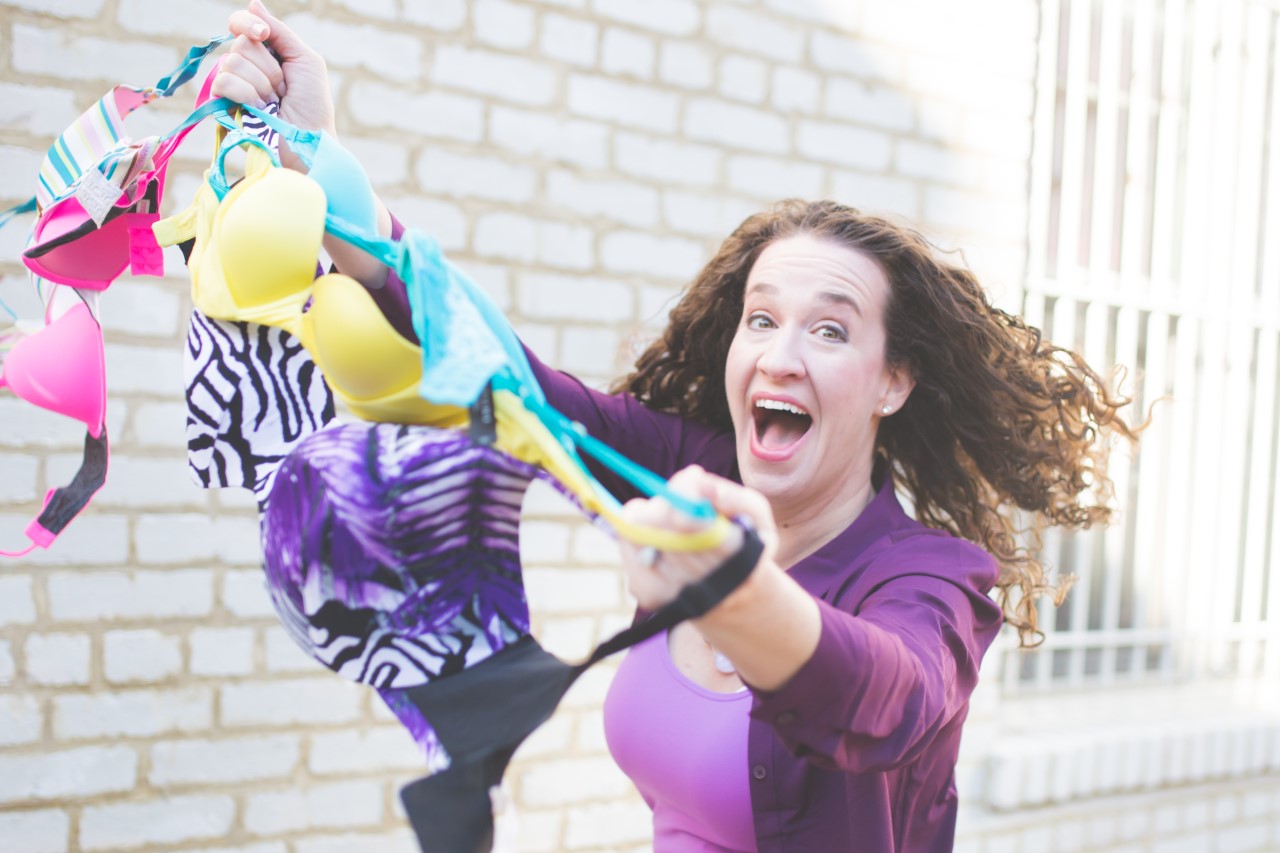I take my bras for granted, as do most women.
I don’t spend a lot of time thinking about how lucky I am to wake up every morning and go about my day in comfort. Not every woman has the opportunity or the access to this kind of comfort in her daily life. In fact, there are thousands of women in the United States alone who are homeless and desperately in need of bras as well as menstrual products to help enhance their human dignity and quality of life.
I recently had the pleasure of speaking with Support the Girls founder Dana Marlowe, who has been working to distribute bras and feminine hygiene products to homeless women around the world
The following conversation has been edited for clarity.
Hello Flo: Where did you find your inspiration for starting Support the Girls?
Dana Marlowe: It was an accident. I never intended to start a global NGO in my spare time. After working out and losing weight, it was my husband who told me that I needed new bras. In July 2015, I went to a Soma store near me. After they fitted me, I asked an associate if they refurbished bras like they do laptops. I wanted to know what I could do with all of my old bras that were still good, but just didn’t fit me anymore. She said that homeless women desperately needed bras. I had never heard of this issue. I went online to do research and I found out that it was true – homeless women desperately needed bras, maxi pads and tampons. All of a sudden, it dawned on me — what it must be like for someone who is homeless or living a transient lifestyle, what it must be like every month to live that kind of life.
There are all of these little fortuitous moments in life and this was one of them. I realized that I don’t know what I don’t know. So I decided to tell all of this, all of what I had learned, to a friend that I truly respect and when I told her about this issue, she said she had no idea. It was in that moment that I realized I wasn’t alone.
HF: How has social media helped grow the movement?
DM: Learning what homeless women needed and that I wasn’t alone was the push that I needed. So, I made a post about it on my Facebook page, that I would be hosting a collection of bras and menstrual products for two weeks. I thought, whatever, maybe some friends would donate. But the post got reshared and reshared. I tried to track all the threads and replies, trying to write down the names of all the people who wanted to donate. I realized that I needed to make this more systematic under one location and that location became Support The Girls.
I created a Facebook page and hundreds of people started signing up. On my lunch hours, I would go around the DC area to collect bags of bras from people’s doorsteps. Now, I get donations from yoga studios, coffee shops, churches, schools- my two young boys were coming home with backpacks full of bras and there was nothing taboo about it. This is a very grassroots movement that has blossomed into large collections from dozens of companies and organizations.
When the Washington Post story hit, my inbox flooded ridiculously. I was surprised by its reach and I couldn’t keep up with the emails, the phone calls, the Facebook private messages — it was so overwhelming. Everyone had the same dozen questions to ask me. So one morning I got up at 4 am before I was supposed to be flying out to Boston, I sat down, bought a domain and created isupportthegirl.org. Then, I woke up my husband and told him that I needed him to make me a website. I told him, “I’m giving you the instructions. I need you to include everything and I need it before I land in Boston. I need this done urgently.” With a website, I was able to copy and paste responses to my most asked questions.
HF: Tell us a little bit about the conversation and the movement towards menstrual equity that Support The Girls has sparked.
DM: After receiving responses from thousands of people who wanted to contribute, I realized I had hit a nerve. This was something very tangible, every women understood it immediately. I didn’t have to explain or prove anything. There was a very instant connection and people wanted to help. The more folks that got on board, the more it snowballed in this organic, beautiful way.
This moment became a movement without me. I was the catalyst. It got to the point where I could have turned away and said “I’m done.” But I didn’t because this movement had grown legs. Instead of turning my back, I could solve the problem in a collaborative way. I pulled in friends in Communications and Public Relations, in Strategy and Operations and we developed an infrastructure.
I worked hard on collaborating to develop a backbone that could support affiliate programs all over the country. I thought, what if I empower other women and girls to do this in their local communities, to collect and donate these products? We have requests from all over the world, from Canada and Mexico and Thailand. At this point, we have collected over 32,000 bras and over 135,000 menstrual products.
HF: How do you think other people can help start this conversation in their own communities?
DM: I think anyone who understands the topic and is willing to talk, that they can help with the stigma. We are talking about dignity and coverage, not sexy lingerie. I think we need to find a way to get the tampon tax revoked and to get products into the hands of people who need them. This is part of a much bigger discourse on human rights and women’s dignity and it’s happening right now.
HF: Can you talk a little bit about your partnership with the company Lola?
DM: We have partnered with the natural menstrual products company Lola, who really create a great product. They have donated over 60,000 tampons for distribution in DC, Chicago and Indianapolis, and these distributions will be continuing over the next year. This is how change happens. We are working with a lot of organizations and companies for collections. The US Department of Agriculture, the National Institute of Health, the US Food and Drug Administration, Sephora, doctors’ offices, OB/GYNs – the span of different organizations and companies is very far reaching.
HF: Is there anything that could have prepared you for the incredible growth of Support The Girls?
DM: Starting any venture requires careful diligence and an understanding of what the potential undertaking might be. This was totally an accident. I understood what I was getting into, I had an understanding to some degree, but it’s mind blowing the speed at which this is changing. Absolutely nothing in my wildest dreams could have prepared me for this. When people recognize me in Costco, it’s wild. I’ve had a lot of interesting opportunities come up, some of which I have turned down. It all blows my mind on a daily basis.
HF: You mentioned that you are often recognized in public from all of the media attention that Support The Girls has been receiving. How does it feel to be the face of this movement?
DM: It doesn’t feel real. I’m happy to help this cause, but I couldn’t have come up with all of this on my own. It’s so much bigger than me and Support the Girls. We have all of these companies reaching out to us and we are trying to figure out if there is a way to bring all of the companies together to strategize. I think about what it would be like if we could all get on a big conference call and just talk for hours. This is an example of how the whole is so much bigger than the sum of its part.
To be asked to speak on national platforms on the topics of dignity, homelessness and breaking down taboos, it doesn’t feel real – like pinch me, when am I waking up?
HF: For as much positive feedback as Support The Girls has received, have you and your organization faced any backlash?
DM: When the Associated Press did their big exclusive story, it went out everywhere. And when people saw the story and heard what we were doing, a lot of people asked, “Why bras and tampons, why not shelter and food?”
I don’t have a background in that. I’m not well positioned to solve those problems. With Support The Girls, I stumbled upon something that hit an international nerve. Yes, it is spreading like wildfire but I feel like I need to do the best that I can given my limited resources and empower the most number of people.
I understand that not all women have periods and not all people who have periods are women. Support The Girls has given menstrual products and bras to transgender men, women and youth. And when we make a post on social media about these kinds of donations, we can see the numbers of likes, of followers drop. Supporting the transgender community turns off some religious groups and conservative people who want to help the homeless demographic that works for them. For me, [supporting the transgender community] is part of being feminist. I want to make sure people that the people who need these products have access.
HF: What is the most important thing you have learned from your work with Support The Girls?
DM: Never make assumptions about somebody else’s background. I have met people with professional careers, who have had amazing backstories in their own right. But for some reason, they just need these basic critical care products of bras and menstrual products and that is all that I need to know.
I’m doing the best I can to learn about menstrual equity. I have been asked to present at national conferences where I need to know my topic well. The irony is that I’m speaking in front of nurses and health professionals and any of them could get up and talk about it better than me. I’m not a doctor. I’m not a social worker. I’m not a reproductive health specialist. I’m literally just a suburban, working mom who is talking about bras that equate to dignity. If I can do that, if I can break down taboos one conversation at a time, it will help normalize menstruation.




comments